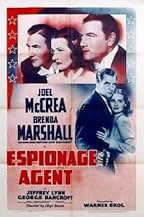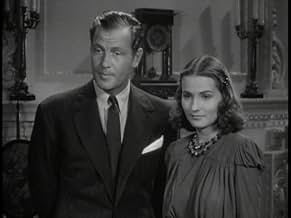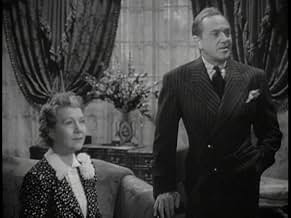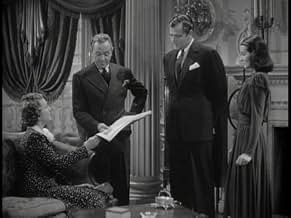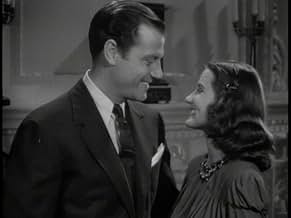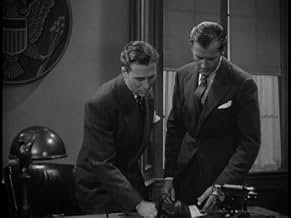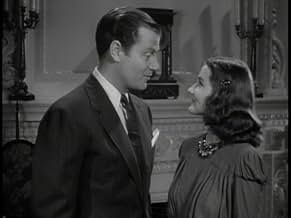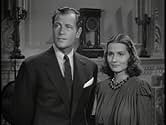After Barry Corvall discovers that his new bride is a possible enemy agent, he resigns from the diplomatic service to go undercover to root out an espionage ring planning to destroy American... Read allAfter Barry Corvall discovers that his new bride is a possible enemy agent, he resigns from the diplomatic service to go undercover to root out an espionage ring planning to destroy American industrial capability.After Barry Corvall discovers that his new bride is a possible enemy agent, he resigns from the diplomatic service to go undercover to root out an espionage ring planning to destroy American industrial capability.
- Awards
- 1 win total
Rudolph Anders
- Paul Strawn
- (as Robert O. Davis)
Hans Heinrich von Twardowski
- Dr. Helm
- (as Hans Von Twardowski)
Emmett Vogan
- Instructor
- (as Emmet Vogan)
Featured reviews
Joel McCrea is training for the US diplomatic service when he meets refugee Brenda Marshall and marries her. Soon. She confesses she is a low-level spy, but loves him so much that she is willing to have her secret outed. When they go to McCrea's bosses, they kick him out of the service, but he and Miss Marshall decide to do some counterspying on their own.
It's the second movie in 1939 that Warners made about the German threat. True, the country is never named, and the uniforms worn merely suggest it, but only Universal had made a stand earlier, and that went away with the Laemmles. This is quite obviously not a major production, and Warners was risking no major assets. They borrowed McCrea from Paramount, and this was Miss Marshall's first credited role. Director Lloyd Bacon obviously shot this on the cheap in his usual high-speed manner, but there's a strident call for tougher anti-espionage laws, and the Foreign Service is talked up as "America's first line of defense."
Cryptography buffs will snort when the new mechanical encryption system is talked up. It boasts over 2700 possible cyphers!
It's the second movie in 1939 that Warners made about the German threat. True, the country is never named, and the uniforms worn merely suggest it, but only Universal had made a stand earlier, and that went away with the Laemmles. This is quite obviously not a major production, and Warners was risking no major assets. They borrowed McCrea from Paramount, and this was Miss Marshall's first credited role. Director Lloyd Bacon obviously shot this on the cheap in his usual high-speed manner, but there's a strident call for tougher anti-espionage laws, and the Foreign Service is talked up as "America's first line of defense."
Cryptography buffs will snort when the new mechanical encryption system is talked up. It boasts over 2700 possible cyphers!
Want to know how much difference a director can make? Watch this film, with Joel McCrea as a blundering American naïf in Europe on the eve of World War II exposing an Axis spy plot under the hacky direction of Lloyd Bacon, and then watch "Foreign Correspondent," which McCrea made the next year in a similar role, similar plot, at least one supporting cast member (Martin Kosleck) in common and even another sequence set during a rainstorm -- but under the direction of Alfred Hitchcock. "Espionage Agent" isn't a bad movie and it probably would be a lot more likable if McCrea hadn't made "Foreign Correspondent" (albeit playing a terminally naïve journalist instead of a terminally naïve diplomat) a year later.
Incidentally, the comment by "bkoganbing" is wrong. Though the film begins in 1915, it quickly leaps forward to 1936 (the year the Spanish Civil War broke out) and the bulk of it takes place in the late 1930's -- though, even so, the German uniforms are otherwise correct but their armbands are missing the swastika. Even after making "Confessions of a Nazi Spy" (which was about Nazi abuses in the U.S., not in their homeland), Warners was still being skittish about directly taking on the German government.
Incidentally, the comment by "bkoganbing" is wrong. Though the film begins in 1915, it quickly leaps forward to 1936 (the year the Spanish Civil War broke out) and the bulk of it takes place in the late 1930's -- though, even so, the German uniforms are otherwise correct but their armbands are missing the swastika. Even after making "Confessions of a Nazi Spy" (which was about Nazi abuses in the U.S., not in their homeland), Warners was still being skittish about directly taking on the German government.
In these days, when many are more concerned about the rights of terrorists than the security of our country, a simple old movie like ESPIONAGE AGENT reminds us that no country can afford to relax its vigilance against terrorists within its borders.
Joel McCrea, on the verge of making one of the best WW2 spy pictures of all (Hitchcock's FOREIGN CORRESPONDENT, 1940), plays a likable US diplomat who makes the mistake of falling for a woman with a shady past. Orphaned in Europe, his wife Brenda was recruited by German spies, and now that she's married into the diplomatic corps, her handlers want her to use her connections for further infiltration. The two lovers decide to play their own double game to bring down the Germans.
There's nothing extraordinary about the film. It's simply done, with solid acting and a taut script with no wasted scenes (and no money wasted on actual location shoots). What makes it seem so special is its timing: being released just as WW2 openly broke out in Europe, and the danger of spies became more of a real threat to free countries everywhere. There's also a nice balance between the spy plot, the romance plot, and some humorous bits involving annoying American tourists.
Just like today's terrorists, the German saboteurs operate under a neutral-sounding front: the WORLD PEACE ORGANIZATION. Early in the picture, discussing the government's reluctance to do something about saboteurs, a high-ranking US official asks a question that rings true here in the post-9/11 world: "Will we as a nation ever learn the difference between tolerance and stupidity?"
Trivia bit: keep your eyes open for Clark Kent AND Perry White from the old SUPERMAN TV series.
And contrary to a previous poster, this film is not in the least confused about which war it's about. The opening scenes, with the father of McCrea's character, take place around WW1. Then there's a very clear narration bringing us up to the late 1930s, and there are several references later on to "20 years ago" (meaning the World War). Someone must have been dozing.
Joel McCrea, on the verge of making one of the best WW2 spy pictures of all (Hitchcock's FOREIGN CORRESPONDENT, 1940), plays a likable US diplomat who makes the mistake of falling for a woman with a shady past. Orphaned in Europe, his wife Brenda was recruited by German spies, and now that she's married into the diplomatic corps, her handlers want her to use her connections for further infiltration. The two lovers decide to play their own double game to bring down the Germans.
There's nothing extraordinary about the film. It's simply done, with solid acting and a taut script with no wasted scenes (and no money wasted on actual location shoots). What makes it seem so special is its timing: being released just as WW2 openly broke out in Europe, and the danger of spies became more of a real threat to free countries everywhere. There's also a nice balance between the spy plot, the romance plot, and some humorous bits involving annoying American tourists.
Just like today's terrorists, the German saboteurs operate under a neutral-sounding front: the WORLD PEACE ORGANIZATION. Early in the picture, discussing the government's reluctance to do something about saboteurs, a high-ranking US official asks a question that rings true here in the post-9/11 world: "Will we as a nation ever learn the difference between tolerance and stupidity?"
Trivia bit: keep your eyes open for Clark Kent AND Perry White from the old SUPERMAN TV series.
And contrary to a previous poster, this film is not in the least confused about which war it's about. The opening scenes, with the father of McCrea's character, take place around WW1. Then there's a very clear narration bringing us up to the late 1930s, and there are several references later on to "20 years ago" (meaning the World War). Someone must have been dozing.
Joel McCrae is Barry Corvall, consulate man who gets married right as the german forces were gathering and getting ready to move on all of europe. Brenda Marshall (in her first credited role!) is "Brenda", another american needing assistance in getting back to america, but of course, she doesn't have a passport. or family. or friends. and acts a bit suspiciously (at least to everyone except Barry...) it all blows up later,and now barry must prove that his new bride hasn't committed any crime. George Reeves (Superman! ) is in here as a bit part of a secretary in the office. sadly, Reeves died young at 45, from a gunshot, under suspicious circumstances. This came out in 1939, the same year that germany rolled into poland. the U.S. would be dragged into it in Pearl Harbor, 1941. directed by Lloyd Bacon, who worked with big stars in films 42nd Street, Marked Woman, WonderBar. and even directed Lucy in two comedies. it's okay, as long as you buy into the storyline. some of it is pretty hard to buy into...but it has the gung-ho patriotic message that we will see in so many WW II films.
There is little doubt in this film that World War II is about to begin. In fact, it was released just twenty-one days after the invasion of Poland by German forces and was in production long before. Scare tactics aside, the movie reveals real fears during the months preceding the war. Spies, counterspies, terror, suspicions, and other prologues to war gave ample warning of renewed global conflict. This movie reflects that warning.Viewing this film leads one to wonder, given the ample clues, how the war could surprise anyone.
Did you know
- TriviaThe working title of this picture was "Career Man". It was released little over four months after another socially conscious Warner anti-Nazi film, Les aveux d'un espion nazi (1939). This was before America's involvement in WWII, when other studios were reluctant to antagonize the Germans. Reviews compared the film to Les aveux d'un espion nazi (1939) because of its exposé about espionage. The theme of Nazi Germany trying to disable the industrial capabilities of the U.S. would be taken up again in Alfred Hitchcock's "Saboteur" (1942), after America's entry into the war.
- GoofsGeorge Bancroft is credited onscreen as Dudley Garrett, but radio announcer Wendell Niles introduces him as Donald Garrett.
- Quotes
State Department Official: Will we in this nation ever learn the difference between tolerance and stupidity?
- ConnectionsReferenced in Une lueur dans la nuit (1992)
- SoundtracksI'll Sing You a Thousand Love Songs
(1936) (uncredited)
Music by Harry Warren
Dance music played after the marriage announcement
Details
- Release date
- Country of origin
- Language
- Also known as
- Espionage Agent
- Filming locations
- Union Station - 50 Massachusetts Avenue NE, Washington, District of Columbia, USA(establishing shot - exterior - archive footage)
- Production companies
- See more company credits at IMDbPro
- Runtime
- 1h 23m(83 min)
- Color
- Sound mix
- Aspect ratio
- 1.37 : 1
Contribute to this page
Suggest an edit or add missing content


